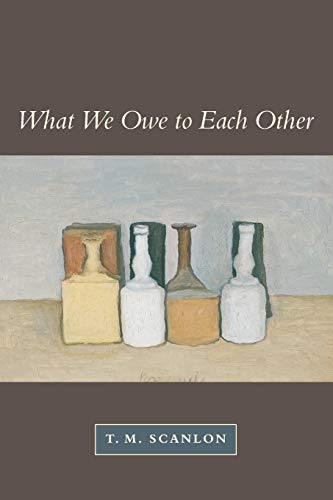what owe de scanlon (71 résultats)
Type d'article
- Tous les types d'articles
- Livres (71)
- Magazines & Périodiques
- Bandes dessinées
- Partitions de musique
- Art, Affiches et Gravures
- Photographies
- Cartes
-
Manuscrits &
Papiers anciens
Etat
Reliure
Particularités
- Edition originale
- Signé
- Jaquette (2)
- Avec images (16)
- Sans impression à la demande
Pays
Evaluation du vendeur
-
What We Owe to Each Other
Edité par Belknap Press, 2000
ISBN 10 : 067400423XISBN 13 : 9780674004238
Vendeur : HPB-Diamond, Dallas, TX, Etats-Unis
Livre
Paperback. Etat : Very Good. Connecting readers with great books since 1972! Used books may not include companion materials, and may have some shelf wear or limited writing. We ship orders daily and Customer Service is our top priority!.
-
What We Owe to Each Other
Edité par Belknap Press of Harvard University Press, Cambridge, Massachusetts and London, 2000
ISBN 10 : 067400423XISBN 13 : 9780674004238
Vendeur : Smith Family Bookstore Downtown, Eugene, OR, Etats-Unis
Livre
Trade Paperback. Etat : Very Good. text clean and unmarked. binding tight. covers have very light wear. edges of pages have light wear.
-
What We Owe to Each Other
Edité par Belknap Press: An Imprint of Harvard University Press, 2000
ISBN 10 : 067400423XISBN 13 : 9780674004238
Vendeur : Dream Books Co., Denver, CO, Etats-Unis
Livre
Etat : acceptable. Heavily loved still intact and perfectly readable . Cosmetic wear only. Former Library book. Ships fast!.
-
What We Owe to Each Other
Edité par Belknap Press: An Imprint of Harvard University Press, 2000
ISBN 10 : 067400423XISBN 13 : 9780674004238
Vendeur : SecondSale, Montgomery, IL, Etats-Unis
Livre
Etat : Very Good. Item in very good condition! Textbooks may not include supplemental items i.e. CDs, access codes etc.
-
What We Owe to Each Other
Edité par Belknap Press: An Imprint of Harvard University Press, 2000
ISBN 10 : 067400423XISBN 13 : 9780674004238
Vendeur : GreatBookPrices, Columbia, MD, Etats-Unis
Livre
Etat : New.
-
What We Owe to Each Other (Paperback or Softback)
Edité par Belknap Press 11/15/2000, 2000
ISBN 10 : 067400423XISBN 13 : 9780674004238
Vendeur : BargainBookStores, Grand Rapids, MI, Etats-Unis
Livre
Paperback or Softback. Etat : New. What We Owe to Each Other 1.4. Book.
-
What We Owe to Each Other
Edité par Harvard University Press, 2000
ISBN 10 : 067400423XISBN 13 : 9780674004238
Vendeur : PBShop.store US, Wood Dale, IL, Etats-Unis
Livre
PAP. Etat : New. New Book. Shipped from UK. Established seller since 2000.
-
What We Owe to Each Other
Edité par Belknap Press: An Imprint of Harvard University Press, 2000
ISBN 10 : 067400423XISBN 13 : 9780674004238
Vendeur : Lucky's Textbooks, Dallas, TX, Etats-Unis
Livre
Etat : New.
-
What We Owe to Each Other
Edité par Belknap Press: An Imprint of Harvard University Press, 2000
ISBN 10 : 067400423XISBN 13 : 9780674004238
Vendeur : GreatBookPrices, Columbia, MD, Etats-Unis
Livre
Etat : As New. Unread book in perfect condition.
-
What We Owe to Each Other
Edité par Belknap Press: An Imprint of Harvard University Press, 2000
ISBN 10 : 067400423XISBN 13 : 9780674004238
Vendeur : California Books, Miami, FL, Etats-Unis
Livre
Etat : New.
-
What We Owe to Each Other
Edité par Belknap Press: An Imprint of Harvard University Press, 2000
ISBN 10 : 067400423XISBN 13 : 9780674004238
Vendeur : Ebooksweb, Bensalem, PA, Etats-Unis
Livre
paperback. Etat : VeryGood. signs of little wear on the cover.
-
What We Owe to Each Other
Edité par Belknap Press: An Imprint of Harvard University Press, 2000
ISBN 10 : 067400423XISBN 13 : 9780674004238
Vendeur : GF Books, Inc., Hawthorne, CA, Etats-Unis
Livre
Etat : Good. Book is in Used-Good condition. Pages and cover are clean and intact. Used items may not include supplementary materials such as CDs or access codes. May show signs of minor shelf wear and contain limited notes and highlighting.
-
What We Owe to Each Other
Edité par Belknap Press of Harvard University Press, 2000
ISBN 10 : 067400423XISBN 13 : 9780674004238
Vendeur : Ergodebooks, Houston, TX, Etats-Unis
Livre
Paperback. Etat : Used: Good.
-
What We Owe to Each Other
Edité par Belknap Press: An Imprint of Harvard University Press, 2000
ISBN 10 : 067400423XISBN 13 : 9780674004238
Vendeur : Ebooksweb, Bensalem, PA, Etats-Unis
Livre
paperback. Etat : LikeNew. Remainder mark.
-
What We Owe to Each Other
Edité par Belknap Press: An Imprint of Harvard University Press, 2000
ISBN 10 : 067400423XISBN 13 : 9780674004238
Vendeur : Ebooksweb, Bensalem, PA, Etats-Unis
Livre
paperback. Etat : New. .
-
What We Owe to Each Other
Edité par Belknap Press: An Imprint of Harvard University Press, 2000
ISBN 10 : 067400423XISBN 13 : 9780674004238
Vendeur : medimops, Berlin, Allemagne
Livre
Befriedigend/Good: Durchschnittlich erhaltenes Buch bzw. Schutzumschlag mit Gebrauchsspuren, aber vollständigen Seiten. / Describes the average WORN book or dust jacket that has all the pages present.
-
What We Owe to Each Other
Edité par Belknap Press: An Imprint of Harvard University Press, 2000
ISBN 10 : 067400423XISBN 13 : 9780674004238
Vendeur : Books Unplugged, Amherst, NY, Etats-Unis
Livre
Etat : New. Buy with confidence! Book is in new, never-used condition.
-
What We Owe to Each Other (Paperback)
Edité par Harvard University Press, Cambridge, Mass., 2000
ISBN 10 : 067400423XISBN 13 : 9780674004238
Vendeur : Grand Eagle Retail, Wilmington, DE, Etats-Unis
Livre
Paperback. Etat : new. Paperback. How do we judge whether an action is morally right or wrong? If an action is wrong, what reason does that give us not to do it? Why should we give such reasons priority over our other concerns and values? In this book, T. M. Scanlon offers new answers to these questions, as they apply to the central part of morality that concerns what we owe to each other. According to his contractualist view, thinking about right and wrong is thinking about what we do in terms that could be justified to others and that they could not reasonably reject. He shows how the special authority of conclusions about right and wrong arises from the value of being related to others in this way, and he shows how familiar moral ideas such as fairness and responsibility can be understood through their role in this process of mutual justification and criticism.Scanlon bases his contractualism on a broader account of reasons, value, and individual well-being that challenges standard views about these crucial notions. He argues that desires do not provide us with reasons, that states of affairs are not the primary bearers of value, and that well-being is not as important for rational decision-making as it is commonly held to be. Scanlon is a pluralist about both moral and non-moral values. He argues that, taking this plurality of values into account, contractualism allows for most of the variability in moral requirements that relativists have claimed, while still accounting for the full force of our judgments of right and wrong. How do we judge whether an action is morally right or wrong? If an action is wrong, what reason does that give us not do it? Why should we give such reasons priority over our other concerns and values? T. M. Scanlon offers new answers to these questions, as they apply to the central part of morality that concerns what we owe to each other. Shipping may be from multiple locations in the US or from the UK, depending on stock availability.
-
What We Owe to Each Other
Edité par Belknap Press of Harvard University Press, 2000
ISBN 10 : 067400423XISBN 13 : 9780674004238
Vendeur : Ergodebooks, Houston, TX, Etats-Unis
Livre
Paperback. Etat : New.
-
What We Owe to Each Other
Edité par Harvard University Press 2000-10-09, Cambridge, Mass. |London, 2000
ISBN 10 : 067400423XISBN 13 : 9780674004238
Vendeur : Blackwell's, London, Royaume-Uni
Livre
paperback. Etat : New. Language: ENG.
-
What We Owe to Each Other
Edité par Belknap Press: An Imprint of Harvard University Press, 2000
ISBN 10 : 067400423XISBN 13 : 9780674004238
Vendeur : Brook Bookstore, Milano, MI, Italie
Livre
Etat : new.
-
What We Owe to Each Other
Edité par Belknap Press: An Imprint of Harvard University Press, 2000
ISBN 10 : 067400423XISBN 13 : 9780674004238
Vendeur : Russell Books, Victoria, BC, Canada
Livre
Paperback. Etat : New. Revised. Special order direct from the distributor.
-
What We Owe to Each Other
Edité par Harvard University Press, 2000
ISBN 10 : 067400423XISBN 13 : 9780674004238
Vendeur : THE SAINT BOOKSTORE, Southport, Royaume-Uni
Livre
Paperback / softback. Etat : New. New copy - Usually dispatched within 4 working days. How do we judge whether an action is morally right or wrong? If an action is wrong, what reason does that give us not to do it? Why should we give such reasons priority over our other concerns and values? This text offers answers to these questions, and explores the views and values behind them.
-
What We Owe to Each Other
Edité par Belknap Press: An Imprint of Harvard University Press, 2000
ISBN 10 : 067400423XISBN 13 : 9780674004238
Vendeur : Ria Christie Collections, Uxbridge, Royaume-Uni
Livre
Etat : New. In.
-
What We Owe to Each Other
Edité par Harvard University Press, 2000
ISBN 10 : 067400423XISBN 13 : 9780674004238
Vendeur : Kennys Bookshop and Art Galleries Ltd., Galway, GY, Irlande
Livre
Etat : New. 2000. Revised. Paperback. How do we judge whether an action is morally right or wrong? If an action is wrong, what reason does that give us not to do it? Why should we give such reasons priority over our other concerns and values? This text offers answers to these questions, and explores the views and values behind them. Num Pages: 432 pages. BIC Classification: HPQ. Category: (P) Professional & Vocational; (UP) Postgraduate, Research & Scholarly; (UU) Undergraduate. Dimension: 234 x 158 x 27. Weight in Grams: 492. . . . . .
-
What We Owe to Each Other
Edité par Belknap Press: An Imprint of Harvard University Press, 2000
ISBN 10 : 067400423XISBN 13 : 9780674004238
Vendeur : Byrd Books, Austin, TX, Etats-Unis
Livre
Paperback. Etat : very good. In Used Condition.
-
What We Owe to Each Other
Edité par Belknap Press: An Imprint of Harvard University Press, 2000
ISBN 10 : 067400423XISBN 13 : 9780674004238
Vendeur : Wizard Books, Long Beach, CA, Etats-Unis
Livre
Paperback. Etat : new. New.
-
What We Owe to Each Other
Edité par Belknap Pr, 2000
ISBN 10 : 067400423XISBN 13 : 9780674004238
Vendeur : Revaluation Books, Exeter, Royaume-Uni
Livre
Paperback. Etat : Brand New. 432 pages. 9.25x6.25x1.00 inches. In Stock.
-
What We Owe to Each Other
Edité par Belknap Press: An Imprint of Harvard University Press, 2000
ISBN 10 : 067400423XISBN 13 : 9780674004238
Vendeur : GreatBookPricesUK, Castle Donington, DERBY, Royaume-Uni
Livre
Etat : New.
-
What We Owe to Each Other
Edité par Belknap Press: An Imprint of Harvard University Press, 2000
ISBN 10 : 067400423XISBN 13 : 9780674004238
Vendeur : GreatBookPricesUK, Castle Donington, DERBY, Royaume-Uni
Livre
Etat : As New. Unread book in perfect condition.








